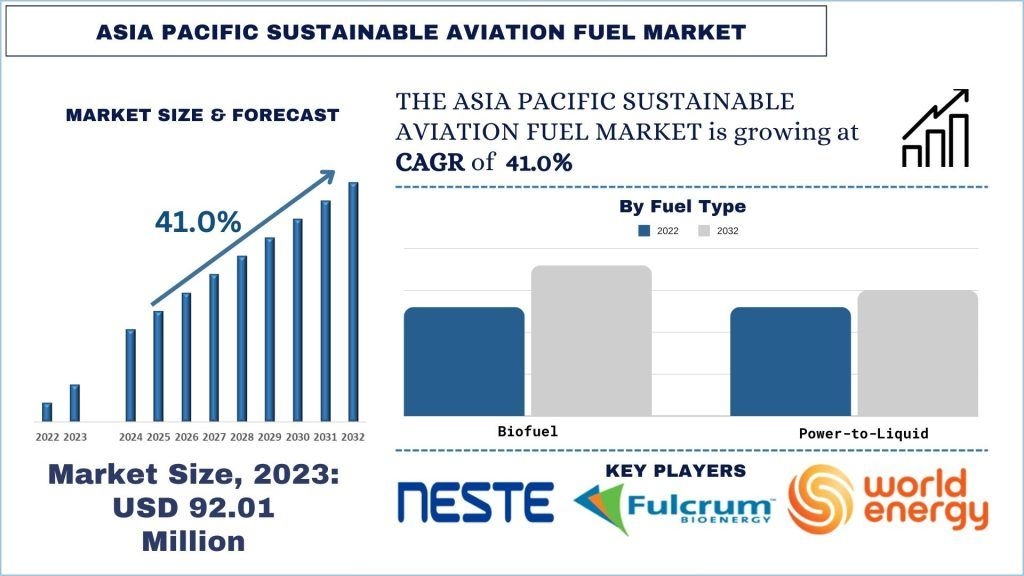Asia Pacific Sustainable Aviation Fuel Market Analysis by Size, Growth and Research Report (2024–2032) | UnivDatos

According to a new report by UnivDatos, The Asia Pacific Sustainable Aviation Fuel (SAF) Market is expected to reach USD 2,628.76 million by 2032, growing at a CAGR of 41.0%. The market has witnessed a remarkable surge in recent years, driven by the growing demand for environmentally friendly air travel. As airlines and passengers prioritize reducing carbon footprints, adopting SAF has become a crucial strategy to address the aviation industry's environmental impact.
Access sample report (including graphs, charts, and figures): https://univdatos.com/reports/asia-pacific-sustainable-aviation-fuel-market?popup=report-enquiry
“SURGING DEMAND FOR SUSTAINABLE AIR TRAVEL”
As the global community strives to find ways to reduce CO2 emissions and fight climate change, the air transport sector has its challenges and prospects. To this end, Asia Pacific has scaled up its efforts towards SAF as the region benefits from supportive energy policies and associations supporting environmentally sustainable aviation. The shift of Asia-Pacific markets to sustainable aviation fuel has been boosted in five countries with new developments in Australia, Singapore, Japan, Malaysia, and Thailand. The Australian government, in the recent 2024/25 budget, has outlined plans to ramp up support of the low-carbon liquid fuel industry, especially for SAFs, while Singapore Airlines and Scoot have made their first purchase of the fuel at Changi International Airport from the recently commissioned Neste Singapore plant which is currently the world’s largest single SAF production facility. Two major collaborations have also been made between Japan and Malaysian partners where SAF to be produced in Malaysia will be imported to Japan to assist that country in achieving its 2030 target of 10% of SAF utilization. Another regional partnership will entail the collection of used cooking oil from another Japanese firm to aid in producing SAF for a new refinery in Thailand to commence by the first half of 2023.
"GROWING GOVERNMENT INITIATIVES AND INCENTIVES"
Governments across the Asia Pacific have not remained idle on this issue and have made policies and incentives for SAF production and usage. For instance:
In 2022, the Singapore Government launched the Sustainable Aviation Fuel Certification Scheme, which aims to promote the use of SAF in the country's aviation sector.
In 2021, the Chinese Government introduced the National Carbon Emissions Trading Scheme, which includes incentives for the use of SAF in the aviation industry.
As part of its National Biofuel Policy, the Indian Government has set a target of 10% SAF blending in the country's aviation fuel by 2030.
Similarly, the South Korean government has announced plans to invest USD 1.8 billion in the development of SAF technologies by 2030. This investment will support the construction of SAF production facilities and advance research and development in the field.
"PRIVATE PLAYERS AND UPCOMING PROJECTS"
The Asia Pacific SAF market has also seen a surge in private sector involvement, with several companies investing in developing and producing sustainable aviation fuel. For instance, in 2024, Airbus expressed its willingness to invest in India to expedite the production of sustainable aviation fuel (SAF). India has the potential to develop a new industry for biofuel production, particularly SAF, not only for domestic consumption but also for export to regions like Europe and Oceania. Moreover, companies, along with the government authorities in the region, are heavily invested in sustainable aviation fuel. Biofuel firms are pouring more than USD 1 billion into building China’s first plants to turn waste cooking oil into aviation fuel for export and meet domestic demand once Beijing mandates the fuel’s use on airplanes to cut emissions. Junheng Industry Group Biotechnology Co Ltd started producing the first SAF last December at a 400,000 tpy plant in the central city of Puyang for 1.3 billion yuan (USD 180 million), becoming the second SAF maker to win airworthiness certification from domestic civil aviation authorities after Sinopec’s Zhenhai.
Click here to view the Report Description & TOC https://univdatos.com/reports/asia-pacific-sustainable-aviation-fuel-market
CONCLUSION
With rising consciousness of decarbonization within the aviation industry, supporting authorities and private organizations, and funding from authorities, the governments of the Asia Pacific countries to reduce the emission of GHG in the coming years, the consumption of SAF is expected to increase in the future. Therefore, the region will multiply due to the activities of governments, private investments, and the growth of awareness of the need to use them in aviation. As the aviation industry in this region expands, SAF is expected to play an essential role in reducing the sector’s negative environmental impact.
Related Reports
Europe Sustainable Aviation Fuel Market: Current Analysis and Forecast (2024-2032)
North America Sustainable Aviation Fuel Market: Current Analysis and Forecast (2024-2032)
Sustainable Aviation Fuel Market: Current Analysis and Forecast (2023-2030)
Advanced Renewable Fuels Market: Current Analysis and Forecast (2023-2030)
E-Fuel Market: Current Analysis and Forecast (2023-2030)
Contact Us:
UnivDatos
Contact Number - +1 978 733 0253
Email - contact@univdatos.com
Website - www.univdatos.com
Linkedin- https://www.linkedin.com/company/univ-datos-market-insight/mycompany/
- Art
- Causes
- Crafts
- Dance
- Drinks
- Film
- Fitness
- Food
- Games
- Gardening
- Health
- Home
- Literature
- Music
- Networking
- Other
- Party
- Religion
- Shopping
- Sports
- Theater
- Wellness


